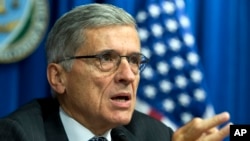U.S. regulators have approved rules banning so-called paid prioritization, in which big Internet service providers would charge content providers a higher fee to stream their material over cyberspace faster than smaller customers.
In a 3-2 vote along party lines, with Democrats in support, the Federal Communications Commission's approved new "net neutrality" rules capping a year of intense debate between supporters of online companies such as Google and Netflix, as well as those of major service providers such as AT&T and Comcast.
The rules ban Internet providers from blocking and unfairly slowing down any web traffic on their pipes or striking deals with content companies for faster or smoother downloads, among other things. Republicans argue the broad scope of the rules represents government overreach.
Communications Act
The ruling confirmed the agency's new policy of regulating broadband, both fixed and mobile, under the Communications Act, which regulates the telephone industry like a public utility.
Following Thursday's vote, FCC Chairman Tom Wheeler said "these enforceable, bright-line rules assure the rights of Internet users to go where they want, when they want, and the rights of innovators to introduce new products without asking anyone’s permission".
Wheeler said "the American people reasonably expect and deserve an Internet that is fast, fair, and open. Today they get what they deserve."
The ruling is expected to be challenged in court by Internet and telecommunications companies, which argue it will discourage investment.
President Barack Obama asked the agency back in November to approve the "strongest possible rules" to protect net neutrality and ensure the equal treatment of all Internet traffic by service providers.
President Obama said Thursday that the FCC decision "will protect innovation and create a level playing field for the next generation of entrepreneurs." He thanked the more than 4 million people who petitioned the FCC and the millions of others who expressed their opinions on social media.
About 4 million people contacted the FCC in support of the president's suggestion.
Net neutrality had been in place before a federal court ruled against it. The FCC responded with a plan last year that would have allowed such major ISPs as AT&T and Comcast to make deals with companies like Google and Facebook to provide them with faster paths for their content to consumers.
Some information for this report came from AP and Reuters.
